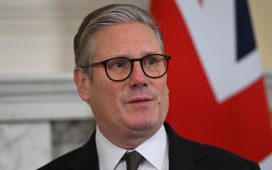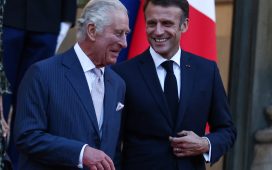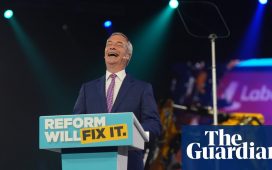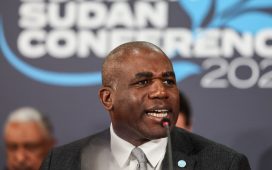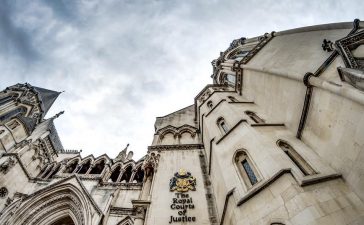Key events
Filters BETA

Severin Carrell
Nicola Sturgeon is to quit as Scotland’s first minister later this morning in a shock decision, it has been confirmed to the Guardian.
A source confirmed Sturgeon, who has been the country’s longest serving first minister and is also leader of the Scottish National party, will announce her resignation at 11am today in Edinburgh.
Sturgeon has suffered a series of political set-backs recently, including the UK supreme court defeat of her plans for a fresh independence referendum and the deeply damaging row over a double rapist sent to a female jail after announcing they were a trans woman.
More to follow, as well as coverage of the 11am press conference.
Nicola Sturgeon to resign as Scottish first minister – reports
Nicola Sturgeon is expected to resign as first minister of Scotland, according to the BBC.
The Scottish National Party leader will give a press conference at her official residence Bute House in Edinburgh at 11am.
It is not clear exactly when she will leave office. Sturgeon is Scotland’s longest-serving first minister having been in post since November 2014.
BBC chief political correspondent Nick Eardley reported a source close to first minister said: “She’s had enough.”

Defence secretary denies he will resign if Jeremy Hunt refuses defence increase
Kevin Rawlinson
Negotiations with the Treasury over public spending levels are always an uphill battle, the defence secretary has acknowledged, amid reports he is looking for up to an £11bn increase in defence spending.
Ben Wallace admitted soaring inflation was hitting the Ministry of Defence’s real-terms budget particularly hard, dismissed suggestions he would resign if the chancellor Jeremy Hunt refused to provide the nominal increase he was looking for.
“I’ve been in this game long enough, I have been a minister for God knows how many years, but it’s always an uphill battle with the Treasury, no matter what department you’re in,” Wallace said on Wednesday.
He told Sky News:
It’s the right thing that the secretary of state will argue for an increase to meet their priorities. And of course, between now and the budget, I’ve got lots of time and lots of meetings with the chancellor to make sure that we try and come to a deal on it.
Wallace said he has not hidden the fact defence suffers “from inflation pressures”, adding:
That’s spending on hardware and infrastructure because of course, that’s where inflation goes to but, you know, we’ll see.
I am not going to conduct the negotiations in public, but obviously, we’re going to try and make our way through this so that between now and the next spending review, which is in two years’ time, we can insulate defence from many of those pressures.
Dame Margaret Hodge said Labour has “moved on from the very dark days of October 2020 when the EHRC judged us to be a party that was discriminating against Jews”.
Her comments come after the Equality and Human Rights Commission watchdog said it is no longer monitoring Labour after it made the changes demanded over its law-breaking handling of antisemitism under Jeremy Corbyn.
Asked if the battle against antisemitism in the party is now over, the Labour MP for Barking told BBC Radio 4’s Today programme:
No, I think we’ve reached a very significant moment, we’ve moved on from the very dark days of October 2020 when the EHRC judged us to be a party that was discriminating against Jews, Labour members expressing Jew hate, we’ve made fantastic progress but I think when you allow antisemitism, Jew hate, to move from the fringes of your party into the mainstream of the party it takes time, commitment, determination to expel it.
We’ve gone much further than I’d of thought, if you’d had me in the studio two years ago I’d have said it will take five, 10 years. You know I lived through the Militant years in the 80s and that was the sort of time it took to expel that sort of ideology from the party, now, two years on, given a clean bill of health by the EHRC so, ironically, I’m really proud I’ve been proved wrong at the speed of change and actually at the fundamental nature of that change.
On the future of former leader Corbyn who is now sitting as an independent and before this morning’s announcement he would not stand as a Labour MP in the next general election (see post 9.38am), she added:
I cannot think of any circumstances whatsoever under which Jeremy could stand as a candidate for the Labour party at the next general election.
He’s been a master of his own destiny, he knew what he did in the past, he knew what he did when the EHRC came out and he’s only got himself to blame.
I’ve moved on from Corbyn, the party has definitely moved on from Corbyn, the country’s moved on from Corbyn if you see what Labour is gaining now in the polls and I think Corbyn is just part of the past, he’s a relic of yesterday.
Labour out of EHRC special measures after progress on tackling antisemitism

Jessica Elgot
The Corbyn announcement comes after Labour was taken out of special measures by the equalities watchdog.
Keir Starmer hailed the progress in tackling antisemitism as a watershed moment for the party and, in a speech on Wednesday, will say there is still significant work to be done.
He will say:
Be in no doubt: the job of restoring Labour is not complete. I don’t see today’s announcement as the end of the road. I see it as a signpost that we are heading in the right direction.
It is 18 months since the Equality and Human Rights Commission found the party had acted unlawfully in its treatment of Jewish members under Jeremy Corbyn’s leadership.
Labour said it had expelled hundreds of members, in a process that has caused deep splits in the party, and proscribed Labour-associated groups that had campaigned against the EHRC recommendations.
The former Labour MP Ruth Smeeth, who detailed extensive antisemitic abuse she received, said she would be “forever grateful” for the progress made under Starmer.
“This is such a welcome development from the EHRC and demonstrates quite how far the Labour party has come under Keir’s leadership to tackle the stain of anti-Jewish hatred that had become so prevalent under the last leader,” she said.
Starmer has also issued an ultimatum to Labour MPs who oppose his plans for government to either support him or leave the party.
Keir Starmer said he “challenged” Jeremy Corbyn “both in the shadow cabinet and publicly” on antisemitism.
Asked by reporters whether he could see antisemitism spreading in the party while he was in Corbyn’s shadow cabinet, the Labour leader said:
As you know, it’s a matter of record that on antisemitism I challenged the previous leader both in the shadow cabinet and publicly on that.
And it’s absolutely clear that the Labour party lost its way and that’s why I knew that my first duty as leader of the Labour party was to change the Labour party and to tear antisemitism out.
That’s why on my acceptance speech, I made an apology on behalf of the Labour party and made that my commitment.
Meanwhile, on whether he will put Momentum, the grassroots movement supportive of Corbyn, “on notice”, Starmer said:
Well, I have many powers and duties and responsibilities in the Labour party, but that one is not for me, I’m afraid. But look, whatever group or individual in the Labour party, I think the message from this morning couldn’t be clearer.
This is an important day. It’s a day of reflection. The change that we brought about is substantial and it is permanent. The Labour party has changed.
And if there’s anyone in the Labour party that does not like that change, then my message to them is very clear this morning: the door is open, and you can leave.
Jeremy Corbyn will not be a Labour candidate at next election, says Starmer
Keir Starmer has said Jeremy Corbyn will not stand as a Labour party candidate at the next general election.
Asked by reporters whether he could say “categorically” whether or not his predecessor will stand for the party at the next election, the Labour leader said:
Let me be very clear about that; Jeremy Corbyn will not stand for Labour at the next general election, as a Labour party candidate.
What I said about the party changing, I meant, and we are not going back, and that is why Jeremy Corbyn will not stand as a Labour candidate at the next general election.
Wallace ‘certainly confident’ UK can deal with airspace threats
Good morning and welcome to the UK politics live blog.
The defence secretary has been giving media interviews this morning and has said he is “certainly confident” the UK could deal with mystery objects such as those shot down over the US.
It comes amid concerns over suspected Chinese spy balloons and follows comments from the prime minister, Rishi Sunak, that the UK could deploy Typhoon fighter jets to deal with any threat to its airspace.
Speaking on BBC Breakfast, Ben Wallace said:
Yes, I’m certainly confident that we could deal with them if we wished to, or indeed if they posed a threat to the population or our national security.
I think the key here is to analyse the data share, you know, with the United States and Canada, what they have discovered and obviously they recovered, and they’re still recovering parts of that debris.
And we’ll learn a lot from that. And I think once we’ve discovered what it was, what some of them were, and we add that to our knowledge of our own atmosphere, and airspace, I think we can get into a pretty good position of being confident about what our limits are, and indeed what we can do about it.
The latest discussion comes as a report from the government’s independent watchdog on surveillance found that British police are leaving themselves open to spying by Beijing because of their reliance on Chinese-made cameras.
Most forces across England and Wales use camera equipment that is either made in China or contains important Chinese components, the biometrics and surveillance camera commissioner has warned.
Asked whether the Chinese government is hacking CCTV in the UK, the defence secretary told Kay Burley on Sky News:
Well, they’re not hopefully … I don’t think they are hacking our sensitive CCTV cameras and we take every effort to protect areas that are sensitive from anybody hacking it, whether it’s China or whether it is another nation.
And there are two parts to protecting our infrastructure. One is to make sure that the quality of the equipment we buy is protected from being hacked.
I’m Tom Ambrose, covering for Andrew Sparrow this week. The Commons is still in recess but I will continue to bring you all the latest news from Westminster throughout the day.

